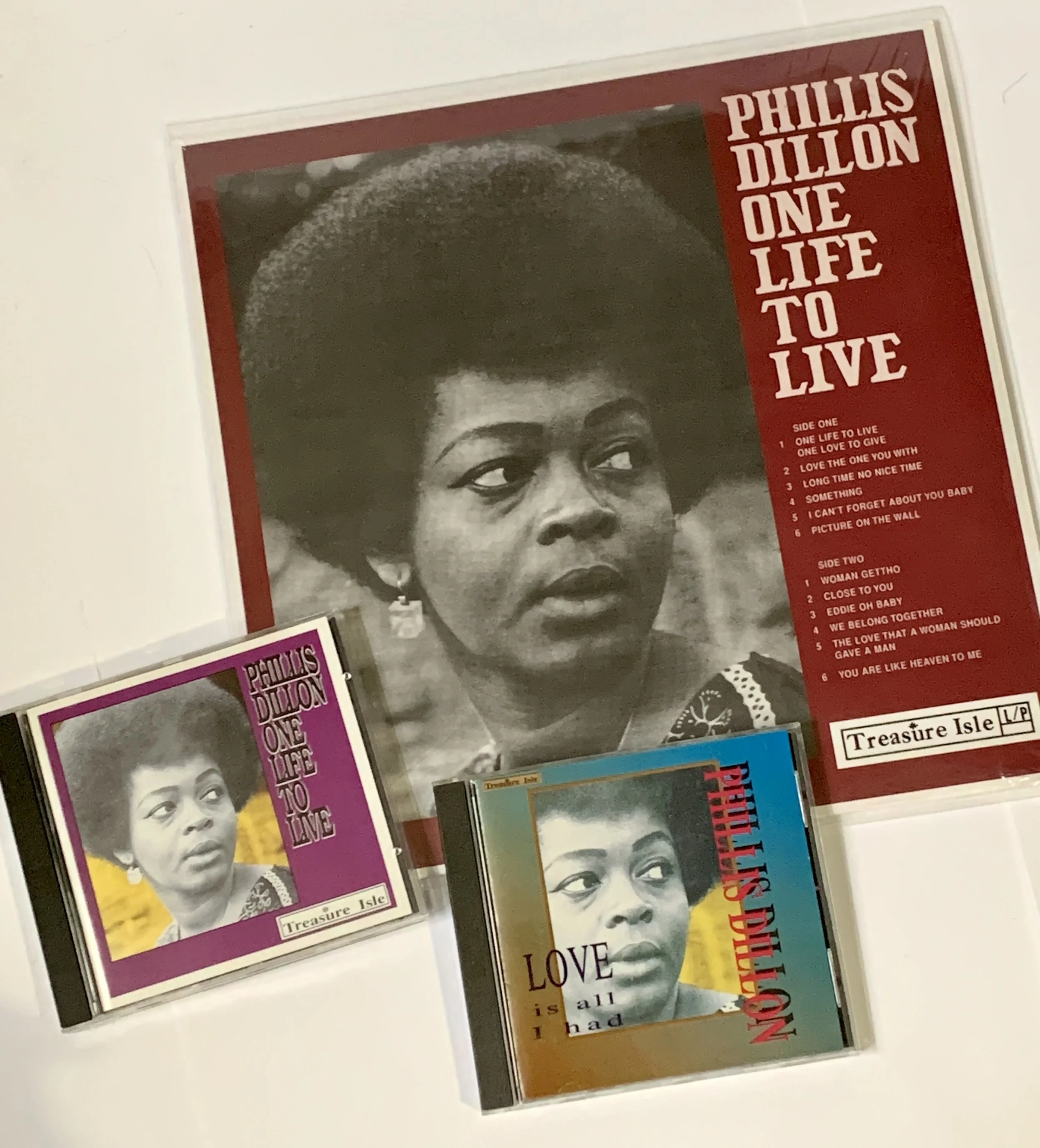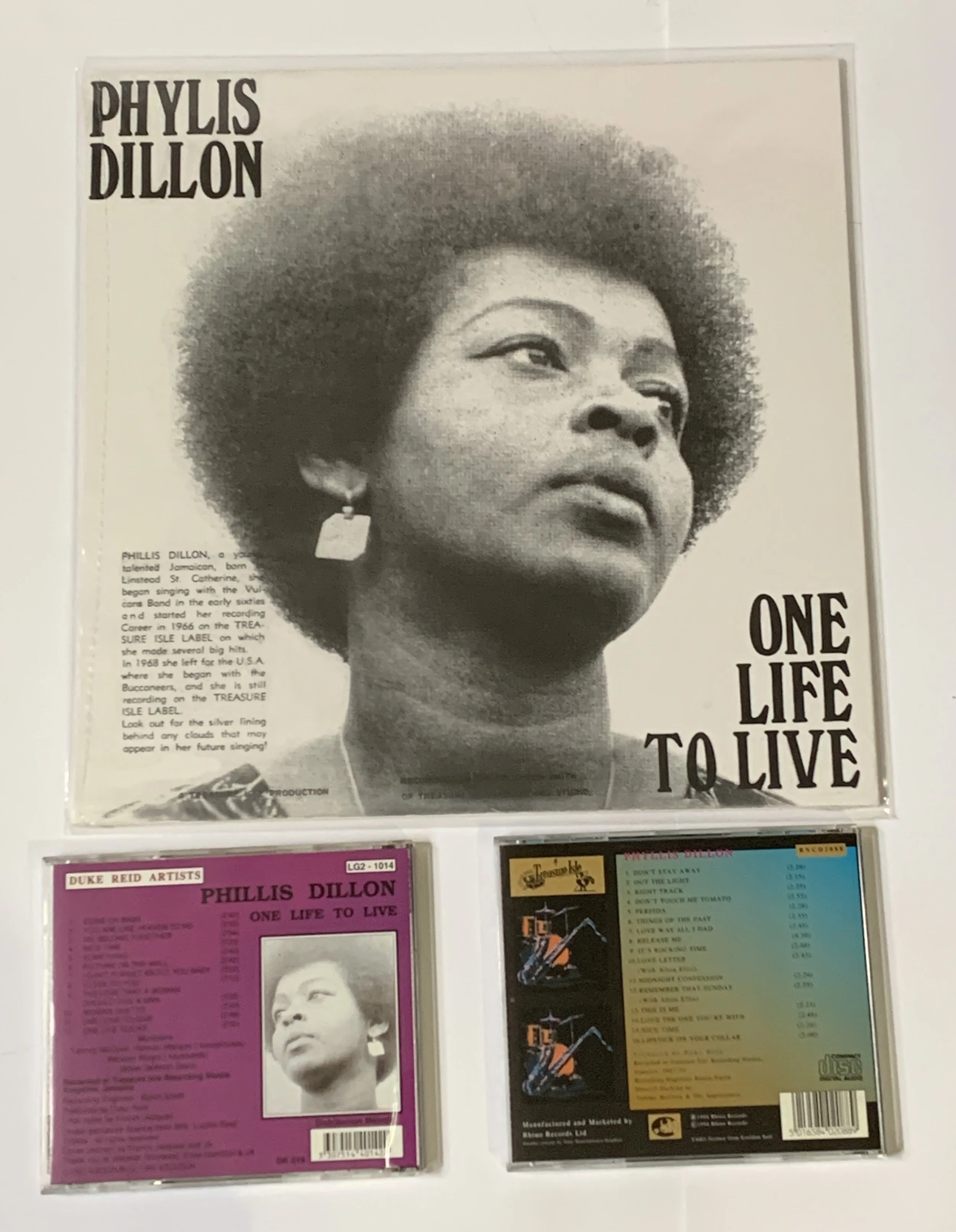A Weekly Song: Episode 4 - Phyllis Dillon
A Weekly Song Episode 4 - Phyllis Dillon
Since the advent of the Internet, and the availability of everything, how we listen to music has changed forever.
Imagine – or remember, if you’re old enough – a time before streaming, before search engines, before Google and Silicon Valley, when it was thought possible to change the world via art, via comics, writing and pop music. Now, such ideas seem quaint, naïve, and yet that was the world I inhabited. In London, where I lived, the early 1990s were a quite glorious, hopeful and inspiring time, an era of potential in which a hugely creative, rapidly evolving and politically aware youth culture began to free itself from the dreary grey and narrow opportunism of Thatcher’s Britain. It seemed viable that you could make a living as an artist, as a storyteller. I was a contributor to a well-known music and comics magazine, I was a working, professional cartoonist; I was in the thick of it.
I was also feeling a bit sorry for myself because I was living in a bedsit after a very brief marriage and divorce. Music was my comfort and my escape. There was a sense of something almost arcane about being into music. It was mysterious, a vast, unfolding soundscape to explore, especially if you had a habit of listening to shortwave radio and pirate radio stations, as I did.
Before the Internet, before Shazam, if you heard something on the radio but you missed the DJ announcing the name of the track, or the artists’ name, or both, you’d have to track that song down. This could involve asking your mates, knowledgeable friends, or going into a record shop and singing the tune, which risked the possibility of pisstakery but might result in finding the song.
To that end, I had a system for reducing that possibility, which was to keep a blank tape in my cassette tray so I could record portions of a song and hopefully, important info at the end of it should the DJ feel moved to impart any.
It was via one of London’s pirate stations that I first heard this week’s song. In those days, I used to work late into the night, writing and drawing pages of comics until deadline day rolled around, whereupon I’d usually deliver artwork in person. There was no Dropbox, no digital delivery of any kind – you stayed up late, listening to music or talk radio, until the work was finished and ready for repro, and then you took it up to the publication offices in town.
There was a reggae and roots station I used to regularly tune into – it wasn’t always broadcasting as it came out of south London and the cops used to drive around the tower blocks there to seize the makeshift transmission aerials that were regularly moved around to avoid equipment being confiscated. It seemed as if no station was ever on exactly the same place on the dial – everything felt transient, nothing was fixed. I moved around the city a lot in those days – I can remember one year when I had three different addresses. The only things that mattered were making stories, comics, and listening to music.
One night, twiddling with the radio dial trying to find one of my usual stations, something swam out at me through the static. A melodic, see-saw rock-steady rhythm glided around a woman’s voice, as plaintive as a high, clear bell. There was something about it that made me quickly press PLAY/RECORD on the cassette deck. At first it sounded like a pretty standard love song, but it’s uptempo, at odds with the lyric which itself is oddly phrased. Her voice threads through it, in and around the swaying, happy patterns of bass and brass, the afterbeat that characterises so much Jamaican music, and then there’s a harmonica solo. Something about that solo makes it suddenly become one of the most simple, mournful laments of all time, and for some reason, hearing it through the flanged waves of interference lent it an extra air of enigma, even though it was over in about two minutes.
It took me about two years to find out what this song was.
The DJ segued into something else after playing it, and no-one I knew recognised it from the snippet I’d taped. The woman was a ghost voice, unknowable, melancholy yet romantic and crackling seemingly forever just out of reach.
In those days, I often frequented a nameless secondhand vinyl record shop down Dawes Road in Fulham that opened only at weekends. Browsing in there one day, I found a copy of Version Galore by the celebrated Jamaican toaster, U-Roy. I’d heard and loved Wake the Town, so this was a must-buy.
The simple joy of dropping a needle on a record you’ve never heard for the first time is one of life’s greatest pleasures, but this one held a particular surprise for me. When a track called Don’t Stay Away began, I leaped out of my chair with delighted recognition – this was my mystery track! On this version, as toasters do, U-Roy floated his own call-and-response over the female vocal. Annoyingly, the owner of that voice wasn’t credited (not uncommon with Jamaican pressings), but I now knew it was a Duke Reid production. It had to be.
A little more detective work and I found that the original version of Don’t Stay Away was indeed on Duke Reid’s Treasure Isle label and featured Phyllis Dillon. Coincidentally, her version of Don’t Stay Away was featured on a box set I’d just ordered, Tougher Than Tough: The History of Jamaican Music.
As any record buyer knows, if your sixth sense is alerted, albums start dropping into your lap and soon enough, I’d found CD re-releases of her one album and a compilation featuring some of her many singles.
On the releases I have, her name is spelled variously as “Phillis” and “Phyllis,” sometimes on the same cover, but I’m pretty sure it’s Phyllis. I found out she’d now mostly left her musical career behind her and worked as a bank teller in New York City. “Her sensual voice and songs like ‘Perfidia,’ ‘Out The Light,’ and ‘Don’t Touch me Tomato’ remain treasured favourites, especially with the ladies,” it says here [Treasure Isle Sleeve Notes 1991, RNCD2088]. If you enjoy this tune, all her other music is most certainly worth checking out. She died in 2004, long before I came to live in New York.
I wonder if she missed singing? She did a little more in later life, a few performances here and there, but there’s not a lot of information available about her, even in the ultimate library known as the Internet.
I’m not really sure why Don’t Stay Away made such an impact on me. You know when you’re hearing something special for the first time, and it knocked me out. I loved it instantly, and I’ve never stopped loving it. I love its apparent simplicity, I love the vocal, I love the happy and the sad. It took me out of where I was and made me wonder who was singing and what it was called. I don’t make lists as such, but this song remains one of my all-time favourites.
Thank you, Phyllis.
Update May 2022: Phyllis (Phillis) Dillon’s one and only LP has been reissued on Treasure Isle Records. The purity of Phyllis Dillon’s voice should be heard on vinyl - track it down if you can.





